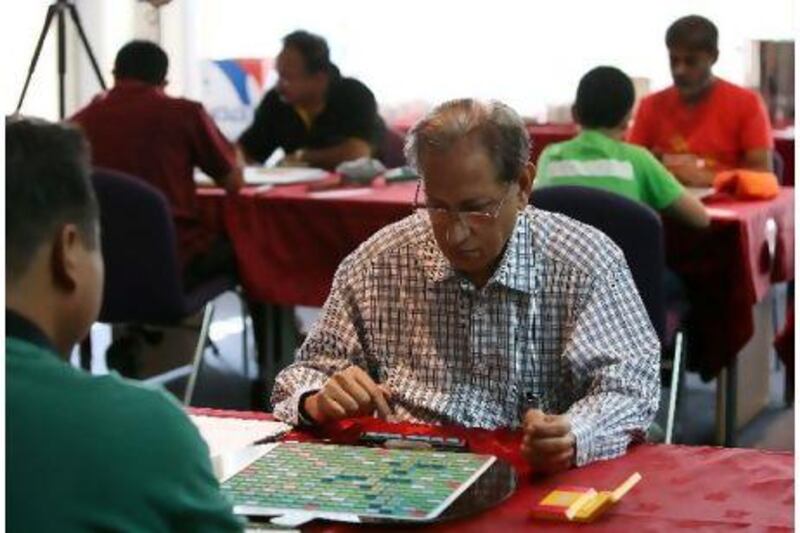DUBAI // Wordsmiths from across the region pitted wits today at the 22nd annual Gulf Scrabble Championship.
The two-day event, at Etisalat Academy, near Mirdif, attracted 25 competitors from across the Middle East.
The tournament followed a round-robin style playoff on Friday, and players were paired up according to points earned to duke it out for first place today.
Scrabble involves players randomly picking seven letter tiles from a bag, then placing them on a board to form words for points.
Longer words win more points and certain squares on the board earn more than others.
Ronald Credo, a two-time former Philippines Scrabble champion, was crowned the overall winner.
"I'm delighted to have won this year," said Mr Credo, a civil engineer in Dubai who has been playing competitively since 1998. "The competition was particularly tough."
Mr Credo won 14 of his 16 matches against players from Bahrain, Kuwait, Oman, Saudi Arabia and the UAE to claim a prize of Dh4,000 and a Dh500 book voucher.
He also defeated the reigning champion, Mohammad Sulaiman, 69, the Canadian managing director of a textile company in Dubai. He had won the competition the previous two years running.
Mr Sulaiman has been playing the game since 1987. He became interested after watching a group of his friends play while he was living in Sri Lanka. He is now one of the oldest active competitive players in the world and finished in 20th place at the 2007 World Scrabble Championships and 23rd in 2010, when he was the oldest competitor.
"I have always been interested in the types of games that challenge you mentally, like chess and bridge," said Mr Sulaiman. "Scrabble really does help outside of just the game by getting you to think tactically, and also boosting the quality of your vocabulary.
"People think it's just a case of making words with the tiles but there is more to it than that and you have to always be thinking several moves ahead."
The key to success in the game, said Mr Sulaiman, is to practise and develop a vocabulary strong in seven-letter words, because they are worth 50 points.
Nikhil Soneja, the event's organiser and a fellow competitor, believes successful players are often the ones who have a good "poker face".
"It's really important to make sure you give nothing away in terms of revealing what kind of tiles you've managed to get," he said. "If the other player knows you have a good hand then they will adjust their strategy accordingly."
Mr Soneja, who has been playing since 1992, says the top competitors regularly play for three or four hours a day before a big contest.
"The players take it very seriously and the best ones have it down to a science," he said. "They leave nothing to chance.
"For example, there are 100 letter tiles in each set. As a result, players will note down what letters have been used and what remain in the bag and so can plan accordingly."
Many players also memorise about 100 of the most common words that crop up during games
Student Sanchit Kapoor was the youngest player in the championship at the tender age of 12, and it was his first competition.
The Dubai Modern High School pupil has been playing since he was 6 and he dedicates at least 45 minutes most evenings to the game.
"I'll be happy [to] finish around 10 or 11th [place] because I'm playing against more experienced players," he said during a break between matches. "I do a lot of practising online and try to learn about five words a day."
Sanchit's aim is to become one of the best players in the region.
"It's a lot of hard work but I really enjoy playing and also the practicing that goes with it," he said.
This is the second year in a row Dubai has hosted the competition. The previous events were in Bahrain.






